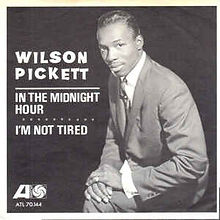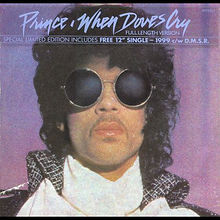Wonderwall (1995)
100


Teenage Kicks (1979)
99

Will You Love Me Tomorrow (1960)
98

I Can See for Miles (1967)
97
New synths, new sexual frontiers, new paranoias. Balancing synth-funk explorations that would reverberate through radio playlists’ ensuing years. It’s not all fun and sex games, of course; even though “1999” makes the idea of impending apocalypse alluring, the planet still goes kablooey when all is said and done. - Maura Johnston

1999 (1982)
96

I Say a Little Prayer (1968)
95
This is one of those soul-influenced, hyper-produced, and horn-driven pop ballads that were prevalent on the radio in the early '70s. The track marked a return to form as well as a literal return to the singer's hometown. A bellowing, mature-voiced Presley unleashes his full power on this watershed ballad. - Bill Janovitz

Suspicious Minds (1969)
94
The lyrics read like a call to order for all post-punk generation rockers. However, the songwriters were clever enough to keep things from getting too overwrought by working in occasional witty moments.The music behind these sentiments has a hypnotic sense of drive, foregoing the usual verse-chorus structure in favor of a circular melody. A cleverly crossbreeds anthemic hard rock with reggae. - Donald A. Guarisco

London Calling (1979)
93
The song that will forever be linked to the piano-pounding shenanigans of Jerry Lee Lewis. He took a mere fragment of the song, recast it into a relentless, pounding boogie rhythm, and imbued the finished product with a leering sexuality that was unmistakable on first listen. - Cub Koda

Whole Lotta Shakin' Goin' On (1957)
92
Most Rolling Stones classics are based around a primal blues-rock riff, and in "Honky Tonk Women," there could have been several. Also crucial to the musical greatness of the track was Charlie Watts' funky, no-frills drumbeats. Although "Honky Tonk Women" is rock & roll, there's a lot of country and blues influence, perhaps even more country than blues. - Richie Unterberger

Honky Tonk Women (1969)
91
A clean-cut, slightly chubby twenty-nine-year-old with a slicked-down spit curl was an unlikely face to
launch a thousand rock ’n’ roll songs, but Bill Haley belting out “Rock Around the Clock” to a musically
undernourished (but demanding) white teenage audience did just that. Its jump-band beat, with dramatic rimshots, marked a radical sonic shift in America’s segregated airwaves. - James Harrison’s

(We're Gonna) Rock Around the Clock (1955)
90

Good Times (1979)
89
Glen Campbell had previously had a number 26 pop hit with the Webb song "By the Time I Get to Phoenix" and the songwriter thought "Wichita Lineman" would be perfect for him. Campbell decided that the only way to get the right vibe was to add Webb's organ to the recording studio. The million-selling "Wichita Lineman" went to number three pop, number one country for two weeks, and number one adult contemporary. - Ed Hogan

Wichita Lineman (1968)
88

Ghost Town (1980)
87

What I'd Say (1959)
86
Van Halen's most successful and best-known hit single of the David Lee Roth era was undoubtedly "Jump." Although it wasn't Van Halen's very first song to incorporate synthesizers/keyboards into their heavy rock sound, David Lee Roth felt that Eddie Van Halen should concentrate more on the guitar rather than keys. Both "Jump" and 1984 are rightfully considered by many to be among the '80s top rock accomplishments. - Greg Prato

Jump (1984)
85

My Girl (1965)
84
Verve singer Richard Ashcroft bought a used copy of the obscure album The Rolling Stones Songbook. He became interested in a small musical phrase that was included on the album's final song, "The Last Time." the Verve sampled a bit for "Bittersweet,"and all hell broke loose when the song was being issued as a single shortly after the release of Hymns. They'd have to surrender 100 percent of the royalties to the Stones' copywriters. - Greg Prato

Bitter Sweet Symphony (1997)
83

Voodoo Child (Slight Return) (1968)
82

Papa's Got a Brand New Bag (1965)
81

Sexual Healing (1982)
80

Papa Was a Rollin' Stone (1972)
79

Blue Monday (1983)
78

The House of the Rising Sun (1964)
77

Brown Eyed Girl (1967)
76

People Get Ready (1965)
75
Simon tried singing the song in falsetto, but decided it was better suited to Garfunkel's angelic tenor. Garfunkel, upon hearing the song, disagreed, and also disputed Simon's contention that it was the best song he'd ever written. But Garfunkel eventually agreed to sing "Bridge Over Troubled Water." The song's lovely melody and generalized message of support, coming at the end of the turbulent 1960s, struck a chord with listeners. - William Ruhlmann

Bridge over Troubled Water (1970)
74

For What It's Worth (1966)
73

Kiss (1986)
72

Don't Worry Baby (1964)
71

Space Oddity (1969)
70

Blitzkrieg Bop (1976)
69

Proud Mary (1969)
68

In the Midnight Hour (1965)
67
Dixon’s track had previously been remodeled, but Page and Plant went further by turning the simple blues number “You Need Love” into a symphonic rock opus.The full-length album version of the song includes an extended break with a drum solo, theremin, and a moaning vocal workout from Plant, which has become known as the “orgasm section.” - Craig Reece

Whole Lotta Love (1969)
66

Eight Miles High (1966)
65

64

Paranoid (1970)
63

Tutti Frutti (1955)
62

A Change Is Gonna Come (1964)
61

She Loves You (1963)
60

Mr. Tambourine Man (1965)
59

Hotel California (1976)
58

Green Onions (1962)
57

Hound Dog (1956)
56

Waterloo Sunset (1967)
55

That'll Be the Day (1957)
54
"Yesterday," a simple, beautiful ballad whose arrangement -- an acoustic guitar supported by a string quartet -- and composition suggested much more sophisticated and adventurous musical territory, which the group immediately began exploring with Rubber Soul. - Stephen Thomas Erlewine

Yesterday (1965)
53

Losing My Religion (1991)
52

Sweet Child O' Mine (1987)
51

No Woman No Cry (1975)
50

Maggie May (1971)
49
One of the best goddamn Rock songs ever produced! The lyrics are out-of-this-world, the rhythm is extremely enticing, and the lyrics are impeccable. It completely changed the perspective of Rock forever. It’s those strained, but composed vocals Robert Plant uses that give the song it’s intensity. Throughout the song, the acoustic guitar and the lead guitar completely captivate one’s mind. - AudiophileParadise

Stairway to Heaven (1971)
48
Four Tops members knew that having Levi Stubbs sing lead was the best thing for the group. Stubbs has a pleading urgency in his voice that perfectly captured the longing anxiousness of the song. The track bubbles over with sharp classical flourishes built on the rock-solid groove supplied by the Funk Brothers, Motown's studio band. The dramatic, semi-operatic tension and release feel of the track was due in part to Brian Holland's immersion into classical music. - Ed Hogan

Reach Out, I'll Be There (1966)
47

Heroes (1977)
46

Let's Stay Together (1971)
45

I Want to Hold Your Hand (1963)
44

When Doves Cry (1984)
43

Get Up (I Feel Like Being A) Sex Machine (1970)
42

Stand by Me (1961)
41

God Only Knows (1966)
40

All Along the Watchtower (1968)
39

Layla (1970)
38

Johnny B. Goode (1958)
37

River Deep, Mountain High (1966)
36

My Generation (1965)
35

Jumpin' Jack Flash (1968)
34

Heartbreak Hotel (1956)
33

Born to Run (1975)
32

Light My Fire (1967)
31

Strawberry Fields Forever (1967)
30

The Message (1982)
29

Imagine (1971)
28

Every Breath You Take (1983)
27

Anarchy in the U.K. (1977)
26

Walk This Way (1986)
25

Walk on By (1964)
24

When a Man Loves a Woman (1966)
23

Purple Haze (1967)
22

I Want You Back (1969)
21

Love Will Tear Us Apart (1980)
20

Hey Jude (1968)
19

Billie Jean (1982)
18

Bohemian Rhapsody (1975)
17

Superstition (1972)
16

God Save the Queen (1977)
15

You've Lost That Lovin' Feelin' (1964)
14

Be My Baby (1963)
13

Louie, Louie (1963)
12

Dancing in the Street (1964)
11

The Tracks of My Tears (1965)
10

You Really Got Me (1964)
9

Respect (1967)
8

Good Vibrations (1967)
7

What's Going On (1971)
6

(Sittin' On) The Dock of the Bay (1968)
5

Smells Like Teen Spirit (1991)
4

Like a Rolling Stone (1965)
3

I Heard It through the Grapevine (1968)
2



